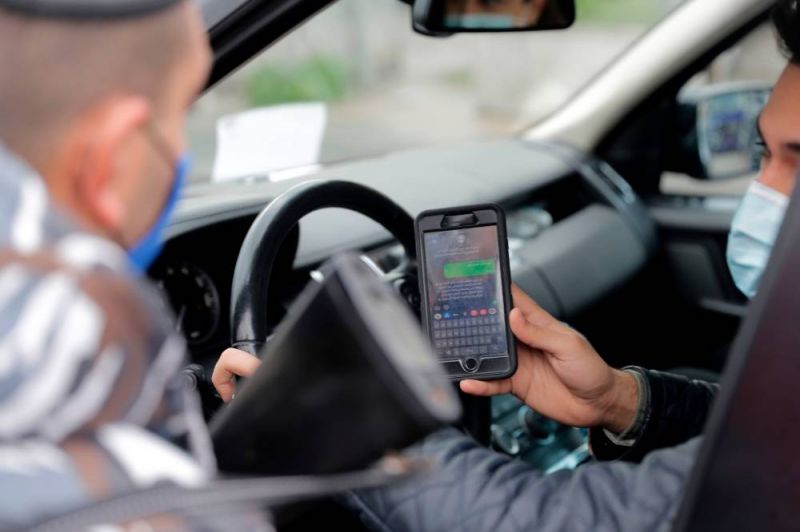
A member of the Lebanese security forces checks a citizen's documents at a COVID-19 checkpoint. (Credit: Joseph Eid/AFP)
BEIRUT — Lebanon will extend its total lockdown, set to expire on Jan. 25, for an additional two weeks to better contain the spread of the coronavirus, caretaker Prime Minister Hassan Diab’s government announced Thursday.
Two weeks into the countrywide lockdown that shuttered all nonessential businesses and a week into a total lockdown that introduced a 24/7 curfew, the Presidency of the Council of Ministers issued a decision to extend the latter until Feb. 8.
Under the extension, exemptions to the curfew and vehicle ban in place will continue to be processed through the recently launched government website.
Since the lockdown came into effect on Jan. 14, 27,515 people have tested positive for COVID-19, while 303 people have died from the illness. The rapid spread of the virus has thrown hospitals into disarray as they struggle to accommodate rising numbers of patients; some have even been forced to turn critically ill people away.
“Hospitals are overwhelmed with the dramatic increase of numbers,” Ola Mazboudi, a pulmonary and critical care specialist at Hammoud Medical Center in Saida, told L’Orient Today.
Yesterday, the national committee on COVID-19 had submitted a recommendation to extend the lockdown amid reports of hospitals across Lebanon operating at full capacity.
“Almost all intensive care units are now fully occupied and we are still having a huge influx of patients coming to emergency rooms,” Mazboudi said.
With Lebanon straining under the burden of an unprecedented financial crisis, the extended lockdown has raised concerns about further damage to the economy and the country’s poorest and most vulnerable families.
“Lockdowns in Lebanon shouldn’t be dealt with in broad strokes because we do not have the capacity to provide relief for people and businesses,” Paul Abi Nasr, a member of the Association of Lebanese Industrialists, told L’Orient Today.
All manufacturing except for medical and food items has been halted. Even printing and packaging factories that are vital in the production cycle of medical and food supplies have been shuttered.
“The economic implications will be unthinkable; what business will be able to pay the salaries of its employees next week?” Abi Nasr asked, adding that factories are inherently controlled environments, inaccessible to the public.
The lack of export, a source of dollars for the economy, will also impact Lebanon’s ever-deteriorating exchange rate, Abi Nasr said. The local currency has lost more than 80 percent of its value against the US dollar.
The poor, elderly, disabled, and refugees are at the forefront of the crisis, having largely been left to fend for themselves. Last week, the government announced that the Lebanese military would start distributing cash handouts of LL400,000 to 280,000 families across Lebanon next month.
According to the World Food Program, 55 percent of Lebanese households lack the means or resources to stockpile food. With supermarkets and grocery stores barred from allowing in-store shopping and failing to meet delivery needs in underserved areas, the risk of households going hungry becomes ever more real.
Earlier this month, the director of Save The Children in Lebanon warned that “almost half of the population can’t afford to buy sufficient food to last them through the supermarket closures,” expressing fear that they will face hunger if stores fail to deliver food to people’s homes.
Aya Majzoub, a researcher at Human Rights Watch, told L’Orient Today that “the Covid-19 pandemic and related lockdowns have exposed the inadequacies of Lebanon’s social protection system.” She called on the Lebanese government to ensure that people “can comply with public health measures without worrying about their next meal.”
“Despite limited resources, the Lebanese government has an obligation, under international human rights law, to protect people’s right to an adequate standard of living, including adequate food and nutrition, the highest attainable standard of health, and social security,” she said.
Earlier this week, Nabil Fahed, the head of the supermarket owners’ syndicate, called for an exemption to allow in-store shopping at supermarkets and grocery stores as they struggle to fulfill the vast number of delivery orders they are receiving.
Additional reporting by Emily Lewis and Abby Sewell.